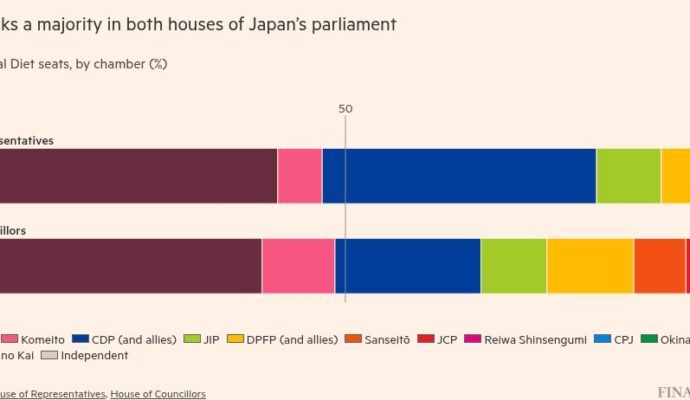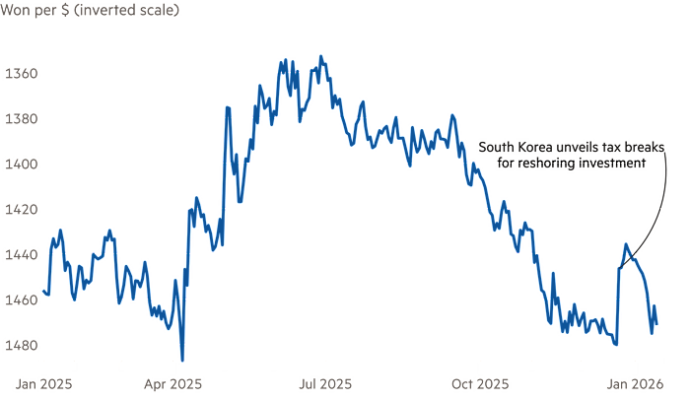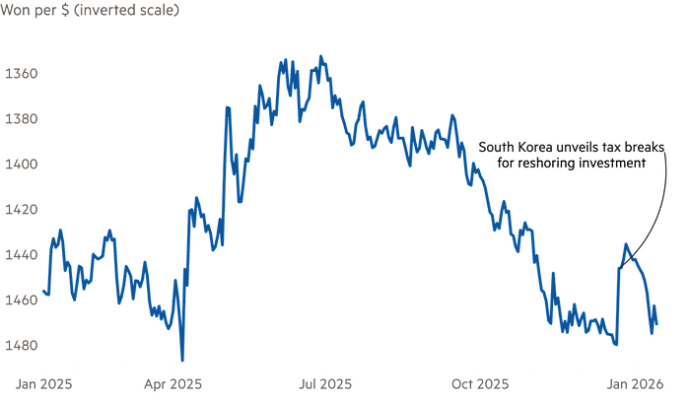Unlock the White House Watch newsletter for free
Your guide to what Trump’s second term means for Washington, business and the world
Donald Trump chided South Korea’s president Lee Jae Myung hours before he was due to host the country’s leftwing leader at the White House, heralding tense talks on trade and the US’s military presence on the peninsula.
In a Truth Social post, Trump made an apparent reference to the political turmoil that has enveloped South Korea over the past year, including the impeachment and arrest of former president Yoon Suk Yeol for trying to impose martial law in late 2024.
“WHAT IS GOING ON IN SOUTH KOREA? Seems like a Purge or Revolution. We can’t have that and do business there. I am seeing the new President today at the White House. Thank you for your attention to this matter!!!” Trump wrote on Monday.
Speaking to reporters later on Monday, Trump said he had heard about “very vicious raids on churches by the new government in South Korea” that “even went into our military base and got information”.
“I don’t know if it’s true or not,” Trump said, but added that the US “won’t stand for that”.
The US president’s threat to limit commercial ties with its long-standing ally comes just before talks between Lee and Trump that are expected to focus on trade.
The two countries agreed last month that Seoul would invest $350bn in the US in return for a 15 per cent tariff on South Korean imports, down from the 25 per cent levy Trump had threatened.
But neither country released an official factsheet outlining the terms of the July 30 agreement and officials from the two governments have offered markedly different interpretations of what was agreed.
Announcing last month’s deal, Trump wrote in a social media post that the $350bn would be “owned and controlled” by the US and spent at his personal discretion.
But Lee’s policy chief later briefed that direct investment would constitute a “low portion” of the spending, with the majority of funds coming from loans and guarantees. He also denied claims by senior US officials that Seoul had agreed to open up politically sensitive beef and rice markets to American exporters.
Yoon, the former South Korean president, was impeached and suspended from office in December last year after he declared martial law and dispatched troops to storm the national assembly following a budgetary stand-off with leftwing parties. He was removed from office in April following a unanimous decision by the country’s constitutional court.
Yoon is now in solitary confinement as he stands trial on criminal charges of sedition. But his hardline supporters have long maintained that his martial law gambit was designed to prevent election meddling by leftist forces aligned with North Korea and the Chinese Communist party.
Many have protested with US flags and English-language “Stop the Steal” signs — an allusion to Trump’s allegations of fraud in the 2020 US election that preceded the storming of the US Capitol by his supporters on January 6, 2021 — in a bid to win the US president’s support for their cause.
Last month, South Korean police opened an investigation into Morse Tan, a former US ambassador-at-large for global criminal justice during the first Trump administration, on suspicion of spreading conspiracy theories about Lee’s victory in June’s presidential election.
Hak Jo Kim, minister for public affairs at South Korea’s embassy in Washington, wrote a column in The Hill last week to reject claims made in the same paper by US commentator Gordon Chang that Lee was “anti-American”.
Chang’s column, which also referred to unsubstantiated allegations of irregularities during Lee’s election, presented an “inaccurate and misleading portrayal” of the country and its alliance with the US”, Kim wrote.
South Korea’s justice minister Jung Sung-ho also said on Monday that Trump had been fed “distorted information” about Lee and his leftwing Democratic Party of Korea.
In a sign of rocky pre-summit talks, South Korea’s foreign minister Cho Hyun and Lee’s chief of staff Kang Hoon-sik both rushed to Washington last week.
“If meeting one more person or making one more argument can help persuade the other side, then of course I should go,” Kang told reporters before flying to the US.
The Trump administration wants to focus its military assets in South Korea on China, leaving Seoul to take on more of the burden of deterring North Korea.
South Korea’s national security adviser Wi Sung-lac said last week that his country was willing to increase its defence spending, while Lee has also declared his intention for wartime operational control of joint forces on the peninsula to be transferred from the US to South Korea by 2030.


